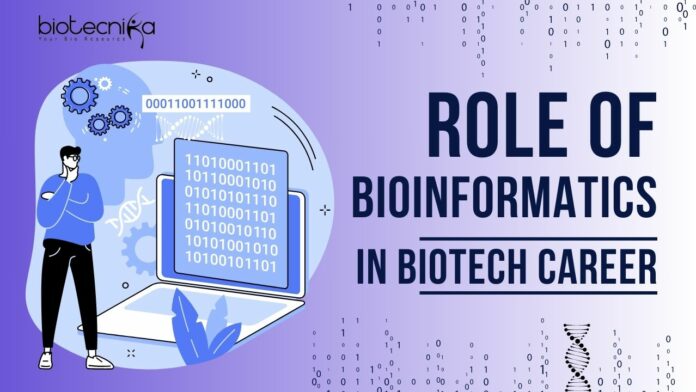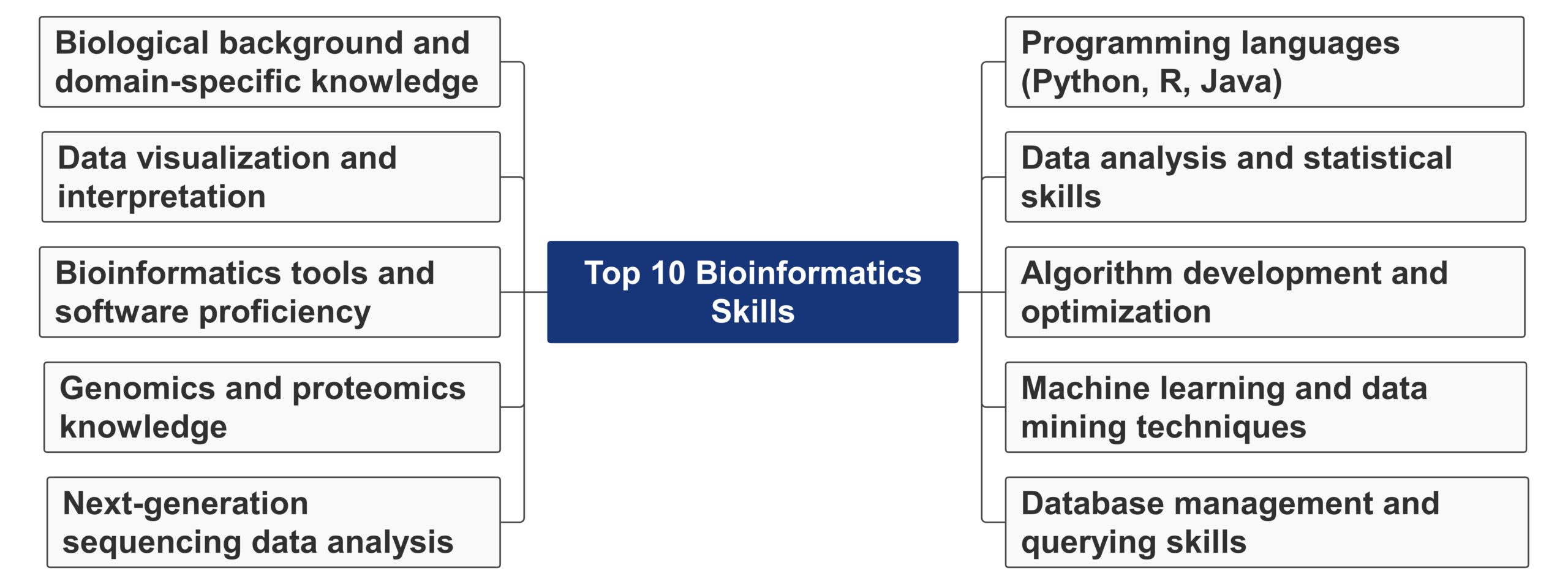Role of Bioinformatics in Biotechnology Career
Science and technology have evolved as a result of the integration of bioinformatics and biotechnology. The importance of bioinformatics skills for employment in the biotechnology sector will be addressed in this article. We’ll explore the necessary skills, various career paths and the evolving nature of the job market. We’ll also look into how bioinformatics is transforming fields such as forensics,Environmental science and nutrigenomics.
Exploring Bioinformatics in Biotechnology
- Bioinformatics is a field that uses computer science, biology, and information technology to study and interpret biological data. It plays a crucial role in biotechnology by aiding in genetic research [1] , finding new medicines [2] and developing new farming methods [3]. According to Kumar and Chordia, 2017; Bioinformatics has become very important, especially in areas like molecular biology, proteomics, and genomics, since the beginning of the human genome project.
Various Job Opportunities
There are many job opportunities in bioinformatics across different sectors such as education, pharmaceuticals, healthcare, and agricultural biotechnology.
- Bioinformatics Scientist: These scientists make computer programs and methods to understand biological information. They figure out complex genetic codes or protein shapes to guide research and create new products, which is very important for drug companies and research centers.
- Bioinformatics Analyst: These specialists focus on managing and studying biological data. They usually use their skills to solve tough biological problems(For example Finding specific protein targets in cancer cells that can be inhibited to stop tumor growth,Using BLAST to find homologous sequences in a newly sequenced bacterial genome to infer gene function & Studying the association of specific SNPs in the BRCA1 gene with increased risk of breast cancer) in government labs, universities, and biotech firms.
- Bioinformatics Engineer: These engineers who know about bioinformatics design and set up the systems needed for good biological data analysis. Their work is important for making tools to study big data sets, pipelines/workflow, NGS data analysis.
- Bioinformatics Technician: Technicians handle the everyday tasks of bioinformatics, like collecting and looking at basic data.
- Bioinformatics Academician: A career path for a bioinformatics academician involves pursuing a BSc, MSc, PhD, or postdoctoral research as part of studies and further acquiring faculty positions at universities or research institutes as an Assistant Professor, Associate Professor or Professor as per the experience in the research field. Proficiency in bioinformatics tools, programming, research, teaching, and management are necessary. Private or public universities with an emphasis on research and instruction might be considered institutions. Publishing research, networking, mentoring, and lifelong learning are all essentials to success.
Growing Importance and Uses
To improve areas of study like genomics [4], proteomics [5], and nutrigenomics [6], Bioinformatics is very important for managing huge amounts of genetic and protein data. It is essential for moving forward in biotechnology research because it helps develop new ways to do dynamic simulations, create models based on similar structures, and make new drugs.
- Uses in Forensics and Defense Against Biological Threats: Bioinformatics provides advanced tools for DNA analysis and examining crime scenes, which greatly impacts fields like forensic science. Similarly, bioinformatics methods used in protecting against biological threats help control these dangers by finding out where pathogens come from and how they spread using analysis of their genetic sequences.[ 7 ]
- Nutrigenomics and Customized Health Care: Nutrigenomics looks at how nutrition interacts with our genes to give personalized diet recommendations. This is done through bioinformatics. It’s important for personalized medicine because it helps create treatment plans based on a person’s genetic information. [ 8 ]
- Using Bioinformatics in Environmental Science: In environmental biotechnology, bioinformatics helps manage and keep track of ecosystems. It aids in handling pollution and protecting biodiversity by helping to understand environmental data.[ 9 ]
WORK IN PROJECTS | PUBLISH PAPERS | GET WORK EXPERIENCE in AI ML
AI/ML in Bioinformatics & Computational Biology Training Program Starts 26th August 2024
The Essential Competencies for a Career in Bioinformatics
A successful bioinformatics job demands a wide range of skills:
-
- Technical Skills: You need to be good at programming languages such as Python, R and Perl. Knowing about machine learning and statistics helps you handle and understand big sets of data.
- Analytic Skills: Strong problem-solving skills are important for understanding complex biological data and making smart conclusions.
- Communication Skills: To work well with different teams and explain complex ideas to people who aren’t experts, good communication is very important.
- Educational Pathways: A bachelor’s degree in bioinformatics, computational biology, or a similar discipline is often required for most bioinformatics positions. A master’s or doctorate degree may be necessary for advanced professions, which prioritize specific knowledge and research skills.
Resources for Skill Development
Many resources are available to help learn the bioinformatics abilities required:
- Online Education: Bioinformatics, programming, and data analysis courses are available on platforms such as Coursera, edX, and Udacity.
- Meetings and Training Sessions: Organizations like the International Society for Computational Biology hold workshops and conferences. These gatherings offer opportunities to connect with people in the field and discover the newest technology and research.
- Books & Publications: David W. Mount’s “Bioinformatics: Sequence and Genome Analysis” and Richard Durbin and colleagues’ “Biological Sequence Analysis” are both required reads. For keeping up with the most recent findings, journals like “Bioinformatics” and “Journal of Computational Biology” are also quite helpful.
- Live projects and internships: Participating in live projects and internships offered by colleges, research centers, or biotech companies gives participants actual experience in real-world bioinformatics applications.
Trends in Technology
Bioinformatics is changing a lot because of new technologies like artificial intelligence (AI), cloud computing, and big data analytics.
AI and Machine Learning: AI is revolutionizing research by solving complex data dependent problems and to predict multi-omics variances pertaining to biology and medical science . AI can be utilized to cut short significant time and regroup the data to extract meaningful information . AI can analyze multi-omics data (Genomes, transcriptomics, proteomics, and metabolomics data) and integrate that data to figure out the causative agent of any disorder.
Cloud Computing: Cloud services enable bioinformaticians to see and analyze large volumes of data from a remote location.These services provide easy and cheap ways to store data and powerful computers to handle the increasing amount of biological information.
Big Data Analysis: Big data Biology are very important for classifying, clustering, and analyzing data to withdraw valuable info. from the biological/bioinformatic and medical datasets. This helps make biological research more accurate and efficient.
The Outlook and Job Market
The need for bioinformatics experts is being driven by the increasing dependence on data-driven biological research and biotechnological advancements as bioinformatics has connections to many other fields, such as environmental science, agriculture, and medicine, graduates of this field have even more career opportunities.
Role of Bioinformatics in Biotechnology Career
Developing Your Career in Bioinformatics
To develop in the field of bioinformatics, one must have both practical experience alongside study/degree. Professionals frequently pursue lifelong learning in order to stay abreast of the swift changes in technology. Internships and cooperative projects may offer real-world experience and support the development of a professional network, both of which are essential for career advancement.
Future Prospects
Bioinformatics, a key component of modern biotechnology, offers a promising future and a variety of career opportunities. It is expected that as biotechnology challenges and develops further, so will Bioinformatics. Development of the field will ensure the demand for skilled bioinformaticians, which would aid in shaping the future of science and medicine as a whole.
The need of a Bioinformatician in the field of Biotechnological research conveys us the importance of using computer based analytics to solve complex biological problems . It provides a path for those who wish to grow in the Life Science field by utilizing the modern techniques to analyze their data in a better way and to take a giant leap professionally.
REFERENCE–
- Joshi, A., Kumar, A., Kaushik, V., Kumar, P., & Dubey, S. (2024). Role of Bioinformatics in Genome Editing. In Advances in Bioinformatics (pp. 161-179). Singapore: Springer Nature Singapore.
- Somda, D., Kpordze, S. W., Jerpkorir, M., Mahora, M. C., Ndungu, J. W., Kamau, S. W., … & Elbasyouni, A. (2023). The Role of Bioinformatics in Drug Discovery: A Comprehensive Overview.
- Prajval, V., Krishnamoorthi, A., Thakur, R., Ruchitha, T., Kapoor, M., Singh, A., & Chittibomma, K. (2024). From Code to Crop: How Bioinformatics is Transforming Crop Genomics in Modern Agriculture and Bettering Environment. Journal of Advances in Biology & Biotechnology, 27(4), 27-49.
- Olorunsogo, T. O., Balogun, O. D., Ayo-Farai, O., Ogundairo, O., Maduka, C. P., Okongwu, C. C., & Onwumere, C. (2024). Bioinformatics and personalized medicine in the US: A comprehensive review: Scrutinizing the advancements in genomics and their potential to revolutionize healthcare delivery. World Journal of Advanced Research and Reviews, 21(1), 335-351.
- Mohanasundaram, S., Dhatwalia, D., Vijayaraghavan, P., Alzubaidi, L. H., & Makhzuna, K. (2023). Bioinformatics: Computational Approaches for Genomics and Proteomics. In E3S Web of Conferences (Vol. 399, p. 04042). EDP Sciences.
- Adetunji, C. O., Olaniyan, O. T., Rebezov, M., Shariati, M. A., Ijabadeniyi, O. A., Ajayi, O. O., … & Odoh, U. E. (2023). Roles of nutrigenomics in drug discovery and development. In Role of Nutrigenomics in Modern-day Healthcare and Drug Discovery (pp. 277-299). Elsevier.
- Sahu, B., Sinha, J. K., Sahu, J. K., Wamankar, S., & KumarNema, R. (2023). A REVIEW ON APPLICATIONS OF BIOINFORMATICS: PHARMACEUTICAL SCIENCES AND BIOMEDICAL SCIENCES.
- Singh, V. (2023). Current challenges and future implications of exploiting the omics data into nutrigenetics and nutrigenomics for personalized diagnosis and nutrition-based care. Nutrition, 110, 112002.
- Rather, M. A., Agarwal, D., Bhat, T. A., Khan, I. A., Zafar, I., Kumar, S., … & Qadri, T. (2023). Bioinformatics approaches and big data analytics opportunities in improving fisheries and aquaculture. International Journal of Biological Macromolecules, 233, 123549.
Role of Bioinformatics in Biotechnology Career



































